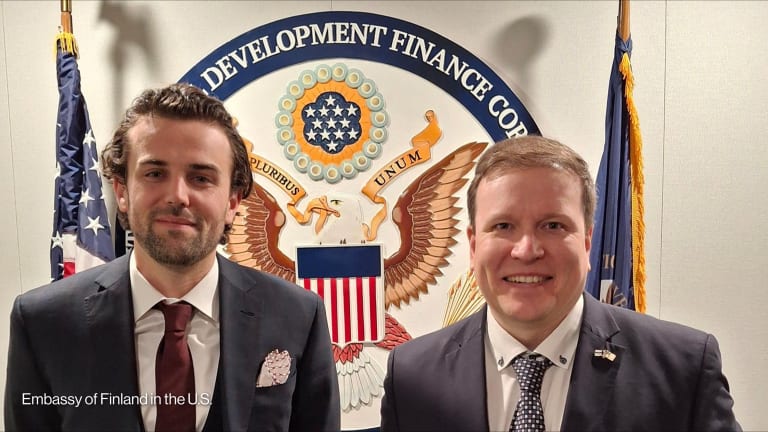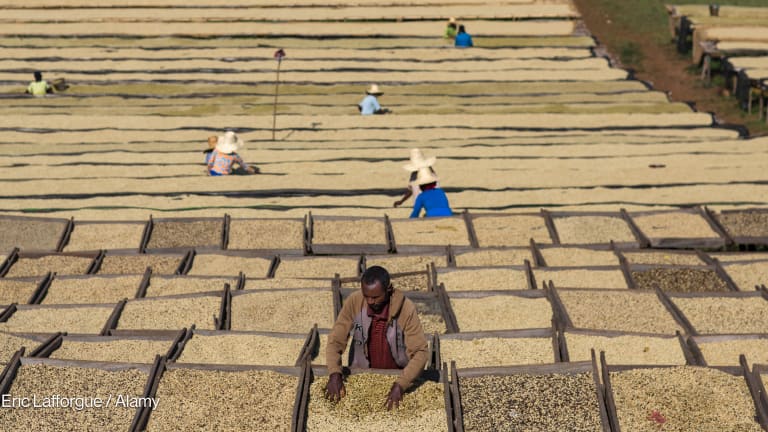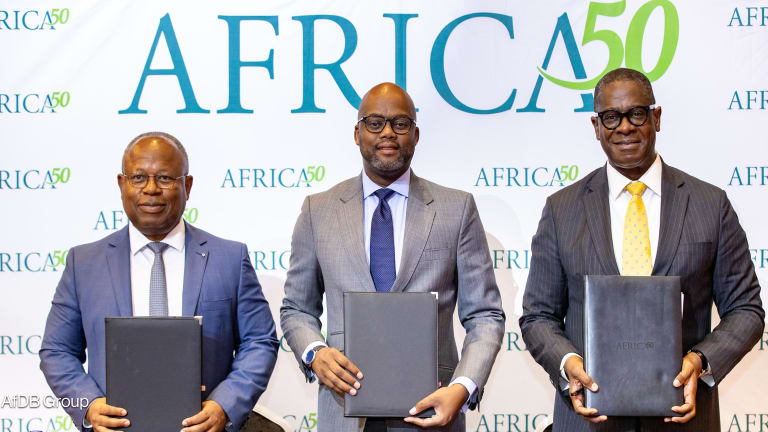Why DAI is joining forces with an investment bank
This week, development consulting group DAI announced it has taken the unusual step of acquiring a majority stake in an investment bank. Devex speaks to the people involved in the deal to learn why.
BURLINGTON, Vt. — International development company DAI took the unusual step this week of announcing a majority investment in a London-based specialist investment bank that focuses largely on African companies. By joining forces with investment group Magister — creating a new venture called DAI Magister — the organization hopes to become a go-to adviser for midsize technology-enabled outfits looking to raise capital in what the partners believe is an investment market poised for major growth. It is a unique move for an international development consultancy that does the bulk of its business with public funding, on behalf of government donors such as the U.S. Agency for International Development and the U.K. Foreign, Commonwealth & Development Office. For DAI, the investment reflects an effort to step outside the realm of subsidized public funding for economic development and to establish a commercially viable approach to growing businesses in lower-income countries. “There are a lot of forces that are against a growth company when you are trying to build it to a few hundred people across multiple markets. … you have to have a degree of agility and adaptation that you just don't need to have in Europe and the U.S.” --— Victor Basta, chairman and CEO, DAI Magister “It was very consciously our idea that we ought to try to do something that planted a flag further out in the commercial world,” John Maris, DAI’s acting chief financial officer and head of DAI Capital, told Devex. “Our economic growth projects have been moving in this direction for a long time ... trying to figure out how you can do things with the least amount of subsidy. All of this market development stuff that we do, it's all about getting people to work together on a commercial basis,” Maris said. Magister has increasingly shifted its focus from Europe to Africa, a trend that the partnership with DAI aims to push even further. Victor Basta, who founded Magister in 2012 and will continue as chairman and CEO of DAI Magister, was initially surprised to learn that a substantial tech-enabled sector existed in Africa, and he was impressed to find organizations that held unique positions in their respective markets — something that was hard to come by in more saturated technology markets in Europe and North America. More significantly, Basta said he was struck by the caliber of the CEOs he found running these companies. “There are a lot of forces that are against a growth company when you are trying to build it to a few hundred people across multiple markets. And to be able to succeed in that, you have to have a degree of agility and adaptation that you just don't need to have in Europe and the U.S.” Basta told Devex. Prior to merging with DAI, Magister managed deals including a $30 million investment by Goldman Sachs in the Kenya-based food marketing platform Twiga, and a $47.5 million investment by TPG Growth in the Africa-focused fintech company Cellulant. DAI Magister’s three-year goal is to become a “reference adviser” for African companies looking for investment in that range — roughly $30 million — meaning that when African organizations shop around for investment banks to help them raise that amount of capital, DAI Magister will always appear on their list, Basta said. At the moment, that is an underserved segment of the market, which means that many African entrepreneurs do not have the same opportunity to develop the kind of growth strategy or plan for eventually selling their company that business leaders in higher-income markets take for granted, Maris said. “There is a skills transfer that's not about how to run your business. It's not about how to produce or market in your industry,” Maris said. “It's about how to raise capital, about how to present your business to international investors, how to plan to exit your business, how to plan to sell it one day, which is critical to an investor that's coming in and they want to know how they're going to get their money back out later,” he added. In the absence of large amounts of inbound, international investment in Africa’s tech-enabled companies, entrepreneurs have not had the same opportunity to develop knowledge and skills in those aspects of running — and eventually selling — a company, Maris said. They might build an interesting company, but their options for expanding it and generating a sizable return on investment from it are limited, he added. That challenge is exacerbated by a lack of investment groups interested in guiding African companies through the growth, investment, and exit planning process. “You talk to the CEOs or the CFOs of companies that are trying to raise capital in these places, and their experience of working with people who help them raise capital has been very poor,” Maris said. These business leaders often find themselves choosing between small, local investment banks that lack the necessary connections to international commercial investors or a large international accounting organization that is more interested in collecting a monthly fee than actively taking risk alongside an entrepreneur and investing in their success, Maris said. “They hire someone, they pay them a bunch of money on a retainer basis, and they sit around for six months or a year and nothing happens,” he added, noting that DAI was impressed by Magister’s track record of actually bringing large private equity funds into African markets, which those investors were not finding on their own. By catering to groups looking for investment in the $30 million range, DAI Magister plans to position itself near the top of the African technology market, Basta said. He hopes that joining forces with DAI, which has a larger footprint on the continent and frequent contact with small and medium businesses that could be poised for investment and growth, will help build out an “early warning radar of companies that are up and coming.” For DAI, part of the reasoning behind the new venture is that if DAI Magister can show success investing in companies on a purely commercial basis at that growth stage, then it will open additional opportunities for investments that include public money or impact capital, Maris said. “You’re doing that from a position of strength,” Maris said. “You can walk into the same investor and say: ‘Look ... you really know how to make money, and we've brought you deals on which you've made money in East Africa. Now, do you want to take a look at this commercial industrial solar company that also has a nice impact benefit?’ It’s a much easier conversation,” he added.
BURLINGTON, Vt. — International development company DAI took the unusual step this week of announcing a majority investment in a London-based specialist investment bank that focuses largely on African companies.
By joining forces with investment group Magister — creating a new venture called DAI Magister — the organization hopes to become a go-to adviser for midsize technology-enabled outfits looking to raise capital in what the partners believe is an investment market poised for major growth.
It is a unique move for an international development consultancy that does the bulk of its business with public funding, on behalf of government donors such as the U.S. Agency for International Development and the U.K. Foreign, Commonwealth & Development Office. For DAI, the investment reflects an effort to step outside the realm of subsidized public funding for economic development and to establish a commercially viable approach to growing businesses in lower-income countries.
This story is forDevex Promembers
Unlock this story now with a 15-day free trial of Devex Pro.
With a Devex Pro subscription you'll get access to deeper analysis and exclusive insights from our reporters and analysts.
Start my free trialRequest a group subscription Printing articles to share with others is a breach of our terms and conditions and copyright policy. Please use the sharing options on the left side of the article. Devex Pro members may share up to 10 articles per month using the Pro share tool ( ).
Michael Igoe is a Senior Reporter with Devex, based in Washington, D.C. He covers U.S. foreign aid, global health, climate change, and development finance. Prior to joining Devex, Michael researched water management and climate change adaptation in post-Soviet Central Asia, where he also wrote for EurasiaNet. Michael earned his bachelor's degree from Bowdoin College, where he majored in Russian, and his master’s degree from the University of Montana, where he studied international conservation and development.








